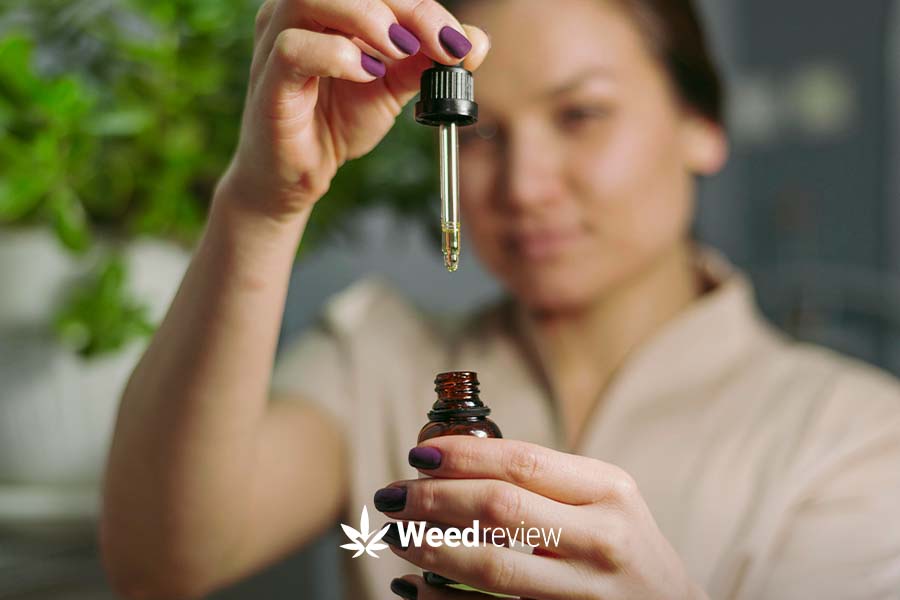
CBD Tolerance: Can your Body Do More with Less Cannabidiol Over Time?

Table of Contents
Marijuana users know how quickly your body can build a tolerance to weed. Over time, more amount is needed to feel the same effects. Even for medicinal users, cannabis becomes a medication that you have to take more as your body becomes desensitised to weed. But is it the case for cannabidiol as well?
CBD neither gets you intoxicated nor is it addictive. Not much is known about its tolerance. Some say it leads to a phenomenon known as reverse tolerance, while others believe that your body gets used to CBD.
This article will examine the key aspects of tolerance to cannabidiol. We will also look at what this means for CBD’s therapeutic uses.
What is tolerance?
Tolerance is a scenario where your body needs more of the substance to feel the effects as felt in the early times. As you take something regularly, your body becomes used to its presence and adjusts itself accordingly. It starts to operate at a new normal where the substance is a part of it. Your body becomes better at handling the effects and maintains homeostasis. This leads to the need for higher doses.
It is the same story with cannabinoids, too.
Cannabinoid tolerance
THC – the main intoxicating chemical in marijuana – binds strongly to the CB1 receptors in our body and effectively takes over and causes the ‘high.’
When you do this regularly, the CB1 receptors get used to it. Chronic THC use desensitises the receptors, and over time, fewer of them are triggered. Your endocannabinoid system (ECS) becomes better at managing large amounts of THC, making the same dose less effective.

With cannabidiol, it is not the same story. CBD does not interact with the receptors in the same way as THC. Different mechanisms are involved in how CBD engages with the ECS – but we do know it is not directly via CB1.
CBD takes one of the 60 different routes within the body to produce its effects. Research shows it can slow down (inhibit) a process known as reuptake, thus raising the levels of endocannabinoids in the body. It can also inhibit the breakdown process, which leads to more of the substance in your bloodstream.
What we do know is that regular CBD use does not appear to cause tolerance, but this is not always the case. That said, we need more studies to look at the long-term use of CBD and whether it causes tolerance.
CBD reverse tolerance
Many long-time are reporting a trend called reverse tolerance, where your body becomes more sensitive to the effects of CBD over time, even with lower doses. The body’s endocannabinoid system adjusts such that it causes an increased response to the compound. This is not proven yet, and more studies are needed to validate this claim.
For medical marijuana products like CBD oil, this reverse tolerance effect can be quite good because:
- You require smaller doses of CBD for the desired therapeutic effects over time. This can benefit conditions like pain, anxiety, or inflammation.
- Long-term CBD users might experience enhanced benefits and better outcomes.
That said, individual responses to CBD will differ. Everyone is unique, and their body responds to CBD as such. Some may experience reverse tolerance, while others may end up building a tolerance to CBD over time.
CBD tolerance v addiction
Your body becoming better at handling CBD does not mean that you are addicted to it.
Cannabidiol is non-addictive and lacks the psychoactive properties associated with THC. Research suggests that CBD has a low potential for abuse or dependence. Tolerance to CBD’s effects is primarily a result of the body’s natural adaptation to the compound rather than a compulsive need for increasing doses.
Regular users of CBD might experience a reduced response over time, needing adjustments to dosage. This tolerance is generally manageable, and stopping CBD does not lead to withdrawal symptoms or compulsive cravings commonly associated with addiction.
Reducing CBD tolerance: What to do
If you think your body is becoming too used to CBD, then you are probably among the rare people who build a tolerance for it. Try the following:
- Take a pause: The most obvious thing to do is just stop using CBD for a few days and see how you respond to it. Since it is non-addictive, you will not see withdrawal symptoms like with THC. Give your body time to reset the system before starting again.
- Reduce your dose slowly: Known as titrate, this practice involves reducing your CBD use in steps daily. If you are taking 50 mg of CBD per day, then reduce to 45 mg for 2 days, 40 mg for 2 days, and so on until you arrive at your preferred dosage.
- Speak to your doctor: You should also consult your doctor for the best guidance on how to adjust the dosages, so you continue to feel the effects.
- Try a different route of use: Oils, edibles, gummies, flowers, topicals – there are many ways you can take CBD. Each takes its own time to produce the effects, and the intensity is also different. Be sure to try them all to find your best fit.
Product quality matters
In many cases, the product not being effective is often misinterpreted as your body having a tolerance to CBD. The truth is, while CBD is a promising natural therapeutic, extracting it is a delicate art which leads to different quality standards in the market.
Choosing a high-quality CBD product can help you experience the effects and benefits more thoroughly compared to inferior options.
Similarly, consider trying different doses and formulations; what worked for your friend may not work for you. If CBD oil from brand A does not work for you, try another company.
Side effects of cannabidiol: What to know when taking CBD for a long time
While CBD is generally well-tolerated, there are some side effects. Most are mild and temporary and not as intense as THC.
Common side effects of CBD can include:
- drowsiness
- Dry mouth
- Lightheadedness
- Diarrhoea
- Mood change
- Changes in appetite
These effects are typically mild and subside as the body adjusts to the compound.
CBD can be bad for liver health, too, with signs of liver damage being one of the potential long-term side effects.
Studies have shown that high doses of CBD can potentially affect liver enzymes. CBD is metabolised by the liver, and it may interfere with the normal functioning of enzymes responsible for metabolizing medications.
This means that if you are taking pain medicines or sleeping pills, CBD can increase or decrease the concentration in the bloodstream. This can lead to adverse effects.
The risk of liver complications appears to be associated with high doses of CBD, typically well above the recommended therapeutic range. It is best to speak to a doctor before you start using CBD for medicinal reasons.
Conclusion
CBD does not seem to build tolerance, but it is not a definite fact. Long-term users may become more used to the effects of CBD, thus needing higher doses. At this point, it can be good to keep an eye out for side effects.
Some, however, may become too sensitised to it – leading to reverse tolerance. This is where you need less CBD to experience the same effects.
Given that CBD is non-addictive and generally safe, it is not too difficult to reduce your tolerance for it. You can either stop using CBD or try a different product – whether it is on the dose, brand, ingredients, or method of delivery.


